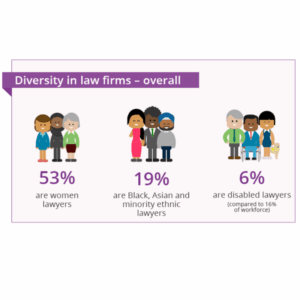Equality, Diversity & Inclusion – Where we currently are

The SRA’s view on EDI is as follows:
‘We have a duty over and above that of many other sectors with regard to diversity, as the legal sector is responsible for the fair administration of justice and should reflect the population it serves.’
With this statement in mind, it is important to ensure that all leaders within solicitor firms have regular EDI training carried out, as they essentially set the tone for a diverse and inclusive workplace. Cpm21 consultant Ameca Jones recently carried out EDI training and this article provides an overview of the importance and implementation of EDI in the workplace based on that training.
First of all, what is EDI?
Equality, Diversity, and Inclusion (EDI) ensures fair treatment and opportunity for all. It aims to eradicate prejudice and discrimination based on an individual’s or group of individuals’ protected characteristics. The protected characteristics under the Equality Act 2010, include age, disability, gender reassignment, marriage and civil partnership, pregnancy and maternity, race, religion and belief, sex, and sexual orientation.

Diversity in the Legal Profession…
The SRA collect diversity data from the law firms that they regulate in England and Wales every two years. Their most recent collection was in summer 2023, when 99% of law firms reported their data, covering more than 203,000 people working in 9,276 firms.
An overview of the data revealed that:
- The proportion of women in law firms has risen from 48% in 2015 to 53% in 2023.
- There has been a steady increase in the proportion of Black, Asian and minority ethnic lawyers in law firms, from 14% in 2015 to 19% in 2023.
- There has been an increase in the proportion of disabled lawyers, from 3% in 2015 to 6% in 2023. However, there is still significant underrepresentation compared to 16% in the UK workforce.
- There has been a slight growth in lawyers who are lesbian, gay, bi or prefer another description over time, from 3% in 2015 to 4.4% in 2023.
- Over a third of lawyers have primary caring responsibilities for children (35%)
- Eight per cent care for others with long-term physical or mental ill health cause by disability or age
- The largest group of lawyers is Christian, followed by those who have no religion or belief. The largest of the other faith groups is Muslim
Is any of this data surprising for solicitor firms?
Consideration must be given to the fact that the SRA do not include their ‘prefer not to say’ data in the results, to ensure a better ‘like for like’ comparison against the national average.
The 2025 SRA Diversity Monitoring Exercise…
The SRA’s biennial diversity monitoring exercise has been announced for this year, including the plan to collect, analyse, report, and publish diversity data from law firms. It is important that accurate data is collected and there are frequent challenges for firms to achieve this, notably where staff find the questionnaire intrusive and either select “prefer not to say” for all answers, or don’t complete the form at all.
The link to the SRA questionnaire is now live however the portal for submission will be open between 9 June and 4 July 2025.
EDI is not only a legal requirement, however, there are specific requirements for a firm if they have a Legal Aid contract, have Lexcel accreditation, or CQS accreditation. Along with requirements of SRA Principle:
Principle No 6:
“You act in a way that encourages equality diversity and inclusion”
There have been some slight changes to policies in some firms in line to EDI, these changes are as follows:
Flexible Working Policy
The 2024 changes to flexible working legislation in the UK granted employees the right to request flexible working from day one of their employment, effectively removing the previous 26-week service requirement. Additionally, employees can now make two flexible working requests in any 12-month period and employers must respond to each request within two months. If an employer refuses a flexible working request, they must provide a reason that is considered “reasonable” based on business needs
Sexual Harassment Policy
The Worker Protection (Amendment of Equality Act 2010) Act 2023, effective from October 26, 2024, mandates employers to take reasonable steps to prevent sexual harassment in the workplace. The duty extends beyond the physical workplace to include work-related events and activities. The law defines sexual harassment as “unwanted conduct of a sexual nature, aiming to violate dignity or create an intimidating, hostile, or offensive environment.”
Trans rights
Recent changes under EDI, particularly after the Supreme Court’s ruling, clarify the definition of “sex” and its implications for trans rights. The ruling, while affirming protections against gender reassignment discrimination, also established that a woman is defined by biological sex, which has implications for single-sex spaces and services. This has led to ongoing discussions and adjustments in policies and practices within organisations.
Importance of Promoting EDI
Building a strong sense of belonging leads to happier, more engaged employees, which in turn drives productivity. When people feel valued and listened to, they’re more likely to stay, reducing turnover and improving retention rates. Expanding hiring practices to include a wider talent pool also strengthens diversity, bringing fresh perspectives and innovation to the team. And of course, all these factors contribute to a company’s reputation—helping to attract top talent and even boosting customer trust.
If your firm requires assistance with the collating of data for the SRA 2025 Diversity Data collection, please get in touch as a member of the cpm21 team will be happy to help.




